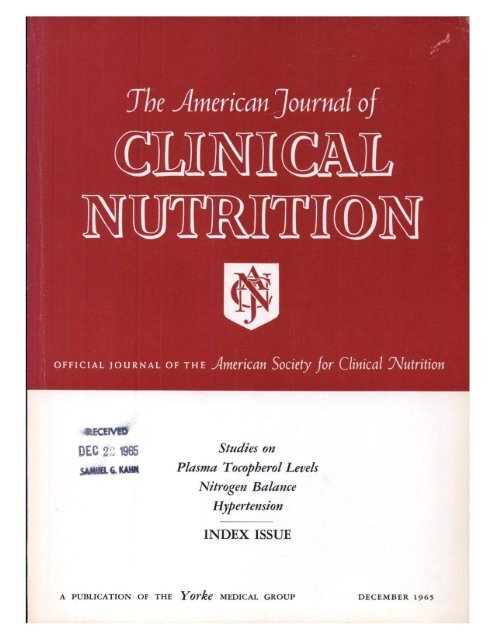Impact of dietary cholesterol from eggs and saturated fat on LDL cholesterol levels: a randomized cross-over study
IF 6.5
1区 医学
Q1 NUTRITION & DIETETICS
引用次数: 0
Abstract
Background
Cardiovascular disease (CVD) remains a leading cause of death. Although dietary cholesterol from eggs has been a focus of dietary guidelines, recent evidence suggests that saturated fat has a greater impact on LDL cholesterol.
Objectives
This study examined the independent effects of dietary cholesterol and saturated fat on LDL concentrations.
Methods
In this randomized, controlled, cross-over study (clinicaltrials.gov, NCT05267522), 61 adults (age 39 ± 12 y, BMI 25.8 ± 5.9 kg/m2) with baseline LDL cholesterol <3.5 mmol/L (135.3 μg/dL) were assigned to 3 isocaloric diets for 5 wk each: high-cholesterol (600 mg/d), low-saturated fat (6%) including 2 eggs/d (EGG); low-cholesterol (300 mg/d), high-saturated fat (12%) without eggs (EGG-FREE); and a high-cholesterol (600 mg/d), high-saturated fat (12%) control diet (CON) including 1 egg/wk. Outcomes were assessed at the end of each diet phase.
Results
Fifty-four participants completed ≥1 diet phase, and 48 completed all diet phases. Compared with CON, EGG but not EGG-FREE reduced LDL cholesterol (CON 109.3 ± 3.1 μg/dL compared with EGG 103.6 ± 3.1 μg/dL P = 0.02 compared with EGG-FREE 107.7 ± 3.1 μg/dL, P = 0.52). Across all diets, saturated fat intake was positively correlated with LDL cholesterol (β = 0.35, P = 0.002), whereas dietary cholesterol was not (β = −0.006, P = 0.42). Compared with CON, EGG but not EGG-FREE reduced concentrations of large (EGG β = −48.6, P = 0.03; EGG-FREE β = −35.85, P = 0.12) and increased concentrations of small LDL particles (EGG β = 95.1, P = 0.004; EGG-FREE β = 55.82, P = 0.10).
Conclusions
Saturated fat, not dietary cholesterol, elevates LDL cholesterol. Compared with consuming a high-saturated fat diet with only 1 egg/wk, consuming 2 eggs daily as part of a low-saturated fat diet lowers LDL concentrations, which may reduce CVD risk. However, this effect on CVD risk may be mitigated, at least in part, by a reduction in less-atherogenic large LDL particles and an increase in more atherogenic small LDL particles.
Trial registration
This trial was registered at clinicaltrials.gov as NCT05267522 (https://clinicaltrials.gov/study/NCT05267522?term=eggs%20and%20cholesterol&rank=3).
鸡蛋和饱和脂肪对低密度脂蛋白胆固醇水平的影响:一项随机交叉研究
背景:心血管疾病(CVD)仍然是导致死亡的主要原因。虽然鸡蛋中的膳食胆固醇一直是膳食指南的重点,但最近的证据表明,饱和脂肪对低密度脂蛋白胆固醇的影响更大。目的:本研究考察了膳食胆固醇和饱和脂肪对LDL浓度的独立影响。方法:在这项随机、对照、交叉研究(ClinicalTrials.gov, NCT05267522)中,61名基线LDL胆固醇< 3.5 mmol/L (135.3 μg/dL)的成年人(年龄39±12岁,BMI 25.8±5.9 kg/m2)被分配到三种等热量饮食,每种饮食五周:高胆固醇(600毫克/天),低饱和脂肪(6%),包括两个鸡蛋/天;低胆固醇(300毫克/天),高饱和脂肪(12%)不含鸡蛋(无鸡蛋);高胆固醇(600毫克/天)、高饱和脂肪(12%)控制饮食(CON),包括每周一个鸡蛋。在每个饮食阶段结束时评估结果。结果:54名参与者完成了至少一个饮食阶段,48名完成了所有饮食阶段。与对照组相比,鸡蛋降低了LDL胆固醇(对照组为109.3±3.1 μg/dL,对照组为103.6±3.1 μg/dL, p=0.02,对照组为107.7±3.1 μg/dL, p=0.52)。在所有饮食中,饱和脂肪摄入量与低密度脂蛋白胆固醇呈正相关(β=0.35, p=0.002),而膳食胆固醇则不相关(β= -0.006, p=0.42)。与CON相比,EGG而非EGG- free降低了较大的浓度(EGG β= -48.6, p=0.03;无卵β= -35.85, p=0.12),小ldl -颗粒浓度升高(卵细胞β=95.1, p=0.004;无蛋β=55.82, p=0.10)。结论:提高低密度脂蛋白胆固醇的是饱和脂肪,而不是膳食胆固醇。与每周只吃一个鸡蛋的高饱和脂肪饮食相比,每天吃两个鸡蛋作为低饱和脂肪饮食的一部分可以降低LDL浓度,从而可能降低心血管疾病的风险。然而,这种对心血管疾病风险的影响可以通过减少不具有动脉粥样硬化性的大ldl颗粒和增加更具有动脉粥样硬化性的小ldl颗粒来减轻,至少部分减轻。临床试验注册:NCT05267522https://clinicaltrials.gov/study/NCT05267522?term=eggs%20and%20cholesterol&rank=3。
本文章由计算机程序翻译,如有差异,请以英文原文为准。
求助全文
约1分钟内获得全文
求助全文
来源期刊
CiteScore
12.40
自引率
4.20%
发文量
332
审稿时长
38 days
期刊介绍:
American Journal of Clinical Nutrition is recognized as the most highly rated peer-reviewed, primary research journal in nutrition and dietetics.It focuses on publishing the latest research on various topics in nutrition, including but not limited to obesity, vitamins and minerals, nutrition and disease, and energy metabolism.
Purpose:
The purpose of AJCN is to:
Publish original research studies relevant to human and clinical nutrition.
Consider well-controlled clinical studies describing scientific mechanisms, efficacy, and safety of dietary interventions in the context of disease prevention or health benefits.
Encourage public health and epidemiologic studies relevant to human nutrition.
Promote innovative investigations of nutritional questions employing epigenetic, genomic, proteomic, and metabolomic approaches.
Include solicited editorials, book reviews, solicited or unsolicited review articles, invited controversy position papers, and letters to the Editor related to prior AJCN articles.
Peer Review Process:
All submitted material with scientific content undergoes peer review by the Editors or their designees before acceptance for publication.

 求助内容:
求助内容: 应助结果提醒方式:
应助结果提醒方式:


